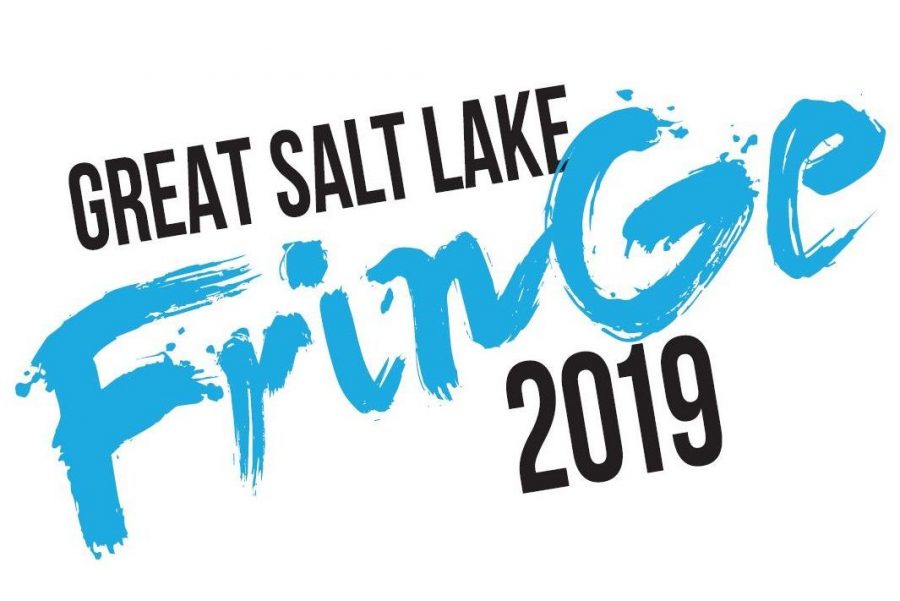It’s okay to admit it — most of the Hollywood blockbusters to have come out this summer are lackluster. Notable critics left and right have rebuked the sour trend, but frankly, it’s no surprise that stocks in the movie industry have fallen following this season’s menagerie of unnecessary remakes, sequels and reoccurring instances of off-putting CGI. Save the twenty-something dollars you were going to waste on a full-priced ticket to “The Lion King” for a home-based outing which glitters with far more relevant and provoking performances instead — the upcoming 2019 Great Salt Lake Fringe, a collection of independent theater productions. Writers and actors may often respond more quickly, even personally, to social dialogue in a black box than in a studio lot. A script’s potential can only rely on expensive-looking explosions for so long.
From August 1 to August 11, Fringe will host over 30 unique shows at the Gateway. According to Salt Lake’s Fringe, they hold to the tradition of all fringe theater festivals in supporting “original works… not grounded to established canon and conventions” and allow artists to run cutting-edge material uncensored through affordable performance spaces. In this way, any local that is dedicated enough to make a polished statement — to share their story — onstage will be able to transform their tears, sweat and hard work into a tangible reality. To Jay Perry, co-director of Great Salt Lake Fringe alongside director Shianne Grey, theater’s inclusion of a variety of everyday, neighborhood artists is what gives the medium its strength. “This year we coined the phrase that Fringe is ‘Utah’s forge for independent theatre,’ and it just feels like the right way to describe what’s happening,” he said. “We’ve been seeing a lot of great new young artists.”
Fringe’s lineup is so diverse in its number of topics, genres and style that its mere presence is nothing short of a revitalizing breath of fresh air to Utah’s sphere of entertainment. Any visitor to the festival is bound to discover one show that satiates their mood and curiosity. Performances range from experimental Shakespeare to RPG-themed spoken-word to clown burlesque. You’ll discover one-man shows, youth performances, comedy routines and dance-infused pieces.
These wildly different types of shows may not appear to have much in common. Perry noted, however, that while “It’s hard to pick one theme, what I have been seeing is there is a lot of socially conscious theater happening this year.” Certainly, a number of the plays at the festival tackle challenging and nuanced issues. “Bang Bang You’re Dead,” from (de)Caf Acting Company features a school shooter as its lead character, An Other Theatre Company’s “Thimble” reframes J. M. Barrie’s “Peter Pan” into a parable about domestic abuse while WTC Black Box describes its performance “Matchstick Theory” as a meditation on “the less friendly aspects of living with a disability.” Other subjects that Fringe’s offerings will cover this year include migration, suicide, familial dysfunction and criminal investigation.
About this arising pattern of shows which touch on controversial matters, Perry said, “I had a strong feeling, as I think a lot of people did after the 2016 election, that there would be a strong response from the arts community, and we’re seeing that unfold.” Additionally, he insisted that it wasn’t simply political turmoil solely responsible for this year’s trend at Fringe, but the diversity of the presenting artists who could share varied viewpoints. “People are pushing the boundaries in new and exciting ways … Fringe really fosters that kind of work,” he said. “Fringe is really bringing a lot of Utah artists to it.” The festival isn’t about drawing threads of subversive commentary from a hat when worldwide media feeds pump out such discourse daily, but drawing it through our own experiences as Utahns.
Although Perry found putting together such a large festival as Fringe together to be difficult — “It’s a lot of logistics,” he said — the effort is “a joy to be a part of” and will pay off to give voice to Utahns’ stories. This year, only one out-of-town act will be performed at Fringe, while the rest have been produced by “some of Salt Lake and Utah’s great talent honing their skills and trying new things.” This artistic life is able to happen through Fringe as these same storytellers “may not have had the opportunity to try [otherwise] because they don’t have the same opportunities [elsewhere].” He added that he believes that this year’s artists truly appreciate having Fringe as an outlet for unconstrained expression and have come up with works of authentic creativity as a result.
As a community effort, Fringe is a subject of emotional attachment to Perry, a Utah native, in his personal life. “I got cast in a musical in high school and got the lead part, and I loved it,” he said. “I remember looking up into the lights at Judge Memorial High … on closing night, and I just thought to myself: this is what I’m going to do.” This passion led him to later study theater at the University of Utah and become the program coordinator for the U’s Youth Theater Program today. “It’s kind of come full circle, in a way.” After discovering the festival that he now heads he said, “I saw what Fringe was and what it was doing in the community,” and it was immediately clear to him that he “wanted to lend a hand.”
Tickets to Fringe can be purchased through their website. The initial cost to see one show starts at $15, while tickets to additional shows cost ten dollars each. Fringe is also offering two other discount packages to give gung-ho enthusiasts more bang for their buck. See three shows for the cost of $30 or for $75, get a ten ticket pack for an entire weekend of fun. Shows will be held all across the Gateway between 133 South and 31 South, so be sure to look carefully at the information on your ticket purchases to know where to head to catch performances on time.
This article has been updated to reflect the role of co-director Shianne Grey to Fringe’s festivities.



